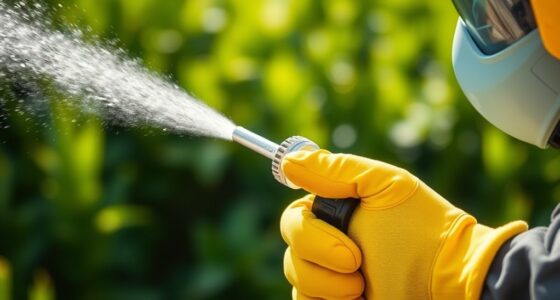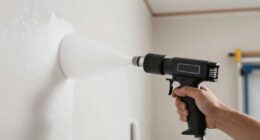If you experience a paint spraying accident, immediately move to fresh air and remove contaminated clothing. Rinse any skin contact with plenty of water and avoid scrubbing, which can worsen irritation. For eye exposure, rinse with lukewarm water for at least 15 minutes and keep your eyes open. Seek medical help if irritation persists or symptoms worsen. Staying prepared and knowing these steps can help you respond effectively—exploring further will give you even more essential tips.
Key Takeaways
- Rinse affected skin immediately with plenty of water and remove contaminated clothing carefully.
- For eye contact, blink rapidly and rinse eyes with clean, lukewarm water for at least 15 minutes.
- Seek medical attention if irritation persists, pain worsens, or symptoms like vision changes or breathing difficulty occur.
- Move to fresh air if fumes or vapors are inhaled and use protective gear to prevent further exposure.
- Follow emergency procedures, including contacting emergency services and using a first aid kit with water, gauze, and eye wash solutions.

Paint spraying accidents can happen suddenly and cause skin or eye irritation, so knowing how to respond quickly is essential. The moment you realize an accident has occurred, your first priority is to guarantee safety by removing yourself from the spray zone if possible. Wearing protective gear, such as gloves, goggles, and a respirator, is vital in preventing further exposure. If you’re already wearing protective gear, stay calm and avoid touching your face or eyes until you can properly address the situation.
In the event of paint splashing onto your skin, immediately rinse the affected area with plenty of water. Use a gentle stream to wash away the paint, avoiding harsh scrubbing that could irritate your skin further. If the paint contains solvents or chemicals, you may need to remove contaminated clothing carefully to prevent spreading the substance. Keep in mind that some paints can cause allergic reactions or skin irritation, so prompt and thorough rinsing is essential. When dealing with eye exposure, blink rapidly to help flush out the paint and then rinse your eyes gently with clean, lukewarm water for at least 15 minutes. Do not rub your eyes, as this can cause more damage or push the paint deeper.
Knowing the emergency procedures in these situations can make all the difference. If paint gets into your eyes or onto your skin, seek medical attention immediately if irritation persists, or if you experience pain, vision changes, or difficulty breathing. Contact emergency services if the exposure is severe or if you suspect poisoning. In situations where paint fumes or vapors have been inhaled, move to an area with fresh air right away. If symptoms like dizziness, headache, or nausea develop, medical help should be sought immediately, and you should inform responders about the type of paint involved. Additionally, integrating automation technologies into safety protocols can help monitor and alert you to hazardous exposure levels more effectively.
Preventive measures are your best defense against accidents. Always wear appropriate protective gear before starting any spray painting activity, and double-check that your equipment fits and functions correctly. Familiarize yourself with the emergency procedures for your specific work environment. Keep a first aid kit nearby, stocked with supplies like water, sterile gauze, and eye wash solutions. Being prepared and knowing how to act quickly can minimize injuries, reduce discomfort, and prevent long-term damage. Remember, quick response combined with proper protective gear and clear emergency procedures can help you handle paint spraying accidents safely and effectively.
Frequently Asked Questions
How Can I Prevent Paint Spraying Accidents Altogether?
To prevent paint spraying accidents, always wear protective gear like masks, goggles, and gloves, ensuring you’re protected from harmful fumes and splashes. Set up a safe workspace by ventilating the area well and keeping it organized to avoid tripping hazards. Follow manufacturer instructions carefully, and never rush the process. Regularly inspect equipment for damage, and stay alert to maintain safety throughout your project.
What Should I Do if Someone Inhales Paint Fumes?
If someone inhales paint fumes, you should immediately move them to fresh air and keep them comfortable. Watch for paint fume symptoms like dizziness, headache, or nausea. Provide inhalation first aid by encouraging slow, deep breaths and reassure them. If symptoms worsen or don’t improve, seek medical help immediately. Your quick action can prevent serious health issues from inhalation of paint fumes.
Are There Long-Term Health Risks From Paint Spraying Accidents?
Yes, there are potential long-term health risks from paint spraying accidents. You might develop long-term respiratory issues or chronic health problems if exposed to paint fumes or chemicals repeatedly or without proper protection. To minimize these risks, always wear appropriate safety gear, work in well-ventilated areas, and seek medical advice if you notice persistent symptoms. Taking these precautions helps protect your respiratory health over time.
How Do I Handle Accidental Ingestion of Paint?
Imagine your body as a fortress under attack by paint poisoning. If you accidentally ingest paint, don’t panic. You should call emergency response immediately, as swift action is crucial. Do not induce vomiting unless instructed by a professional. Rinse your mouth with water and keep calm. While awaiting help, stay upright to prevent choking. Your quick response can help minimize damage and protect your health.
When Should I Seek Professional Medical Help After an Accident?
You should seek professional medical help immediately if symptoms worsen or don’t improve after initial first aid, such as persistent difficulty breathing, chest pain, or severe dizziness. If you notice signs of chemical burns, unconsciousness, or if the paint ingestion was significant, get a medical assessment promptly. Emergency treatment may be necessary, so don’t delay in visiting a healthcare facility or calling emergency services for proper care.
Conclusion
Remember, quick action can make all the difference in paint spraying accidents. While some believe that rinsing immediately is enough, evidence shows that prompt, thorough cleaning and medical attention are vital for serious exposure. Don’t underestimate the risks—treat every incident seriously, and trust that proper first aid can prevent long-term harm. By staying prepared and informed, you can protect yourself and others from the potentially harmful effects of paint spray accidents.









